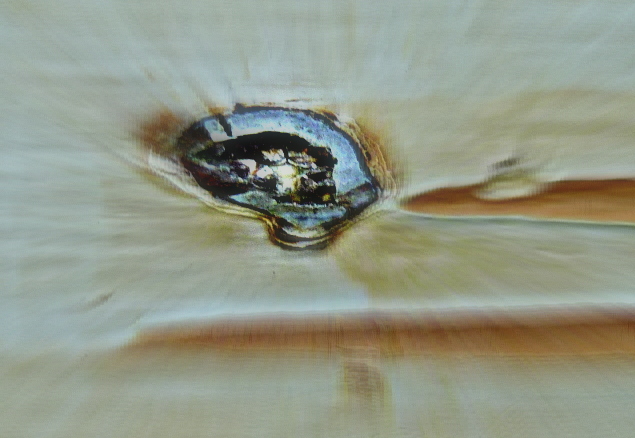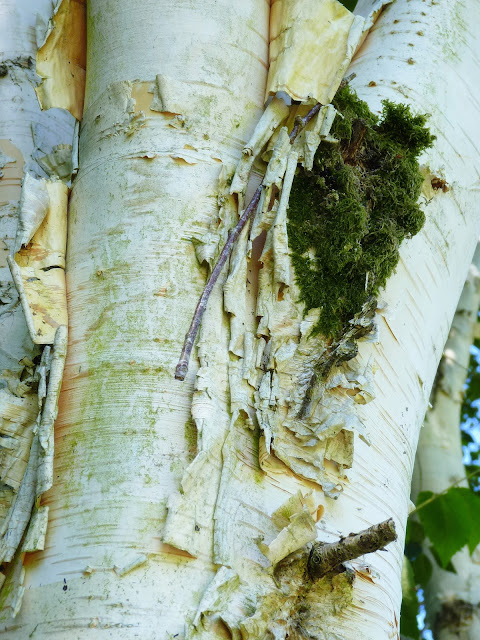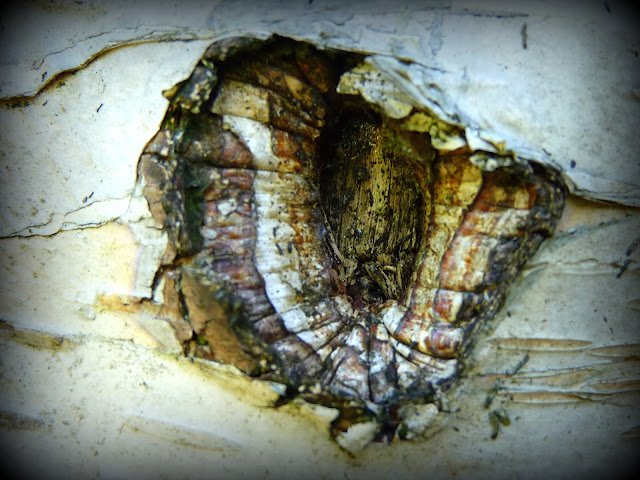Silver Birch (Betula pendula) is a species of tree in the
family Betulaceae, native to Europe, though in southern Europe it is only found
at higher altitudes. Its range extends into southwest Asia in the mountains of
northern Turkey and the Caucasus. It is
a broad leafed deciduous tree.
Silver Birch a medium-sized tree, typically reaching 49–82 ft tall (exceptionally up to 128 ft, with a slender trunk usually under 16 in diameter, but exceptionally to 3.3 ft diameter, and a crown of arched branches with drooping branchlets. The bark is white, often with black diamond-shaped marks or larger patches, particularly at the base. The shoots are rough with small warts, and hairless, and the leaves 1.2–2.8 in long, triangular with a broad base and pointed tip, and coarsely double-toothed serrated margins. The flowers are wind-pollinated catkins, produced before the leaves in early spring, the small winged seeds ripening in late summer on pendulous, cylindrical catkins.

Birch has a number of human uses. The timber has
traditionally been used in Scotland in houses, furniture, carts, ploughs, gates
and fences. While other parts of the UK used to shun the use of birch except
for its traditional use of broomsticks. Today, Birch timber has a variety of
uses and large amounts of birch brushwood are used annually for racecourse
jumps. Other parts of the tree were also useful. The bark was used for tanning
leather and the sap was thought to have medicinal benefits for kidney stones
and other ailments.
The sap was also useful as it is a good source of sugar and can be brewed into beer or wine and is still commercially made in Scotland. The wood can make excellent timber for carving kitchen utensils such as wooden spoons and spatulas: it’s very mild, sweet flavour does not contaminate food, and it has an attractive pale colour. Bark can be heated and the resin collected; the resin is an excellent water proof glue and fire starter.
In tree lore and folklore the Birch is the tree of Venus and has a number of properties associated with it. It is believed to protect against evil spirits and the evil eye but it also symbolises love and fertility. In medieval times, a bundle of birch twigs was carried by the local magistrate on his way to court as a symbol of his authority and as a means of correction. The use of the birch as a punishment probably originates in the need to drive out evil spirits.

Silver Birch is Finland's national tree. Occasionally one uses leafy, fragrant boughs
of Silver Birch to gently beat oneself in a sauna. The boughs are called vihta
or vasta. This has a relaxing effect on the muscles.

In Sweden, the bark of birch trees was ground up and used to make bark bread, a form of famine food. The removal of bark was at one time so widespread that Carl Linnaeus expressed his concern for the survival of the woodlands.
I enjoyed experimenting with the original couple of photos as I thought an artist might enjoy painting some of them. Now I know some of will hate them and some may like one photo. It was be good to know. However I thank you for visiting today.
THANKS YOU TO ALL who left comments on any of my blogs.









loving nature's bounty you have portrayed Margaret
ReplyDeleteVery enjoyable and informative post. I love silver birches, we have a number around the house here. Birch is also the first tree of Ogham, the first language to be written down and used by the ancient Irish and British peoples. "B" is the first letter, standing for Beithe (birch) and meaning new beginnings, so it has spiritual significance too.
ReplyDeleteI love these trees.
ReplyDeleteBeautiful trees and nicely photographed.
ReplyDeleteIsn't nature wonderful? And so are your photos of this beautiful tree Margaret. Wishing you a wonderful weekend!
ReplyDeleteInteresting Birch info, we used to write on the peeled bark we'd find on the forest floor..made cards for our Moms and Grammas...
ReplyDeleteAlso ex or current members of the Cubs are taught to use the bark that has peeled away to help start camp fires.
ReplyDeletewe don't have birch or aspen trees here. guess we're too hot and dry for them. i love the peeling bark - and the smell of the wood.
ReplyDeletelove those trees. they are amazing, margaret, and beautifully photographed.
ReplyDeletethanks for sharing.
have a lovely weekend, dear!
big hugs~
Beautiful images. Some of them almost look like an eye looking back at me.
ReplyDeleteBirch art, I love it! Though I would definitely not want to eat that bark bread! It likely has enough fiber to knock a horse over. I love birch trees and also love snapping them, we have many around here, but I do not know if they are silver ones. I love your first and third pictures, plus the peeling bark macros.
ReplyDeleteOur neighbor has a beautiful birch, it's on the property line so I consider it to be shared ;)
ReplyDeleteGorgeous images, so much pretty detail in these close up!!
Lovely, the Silver Birch is my favourite. Cheers Margaret for making time a photography.
ReplyDeleteLove these trees- thanks for the information!
ReplyDeleteBeautiful photos of the Silver Birch... Love seeing macros like that... It helps us see things up close and personal. You could show most any of those photos and not tell us what it was --and most of us wouldn't recognize it as a birch....
ReplyDeleteThanks for sharing. Great photos.
Hugs,
Betsy
I really like these photos of the birch trees. You've done very well with all of these closeups.
ReplyDeleteOh thanks for sharing those wonderful images of the birch and for great information!!
ReplyDeleteWonderful - we have some silver birch in our garden - hardly native but splendid never the less!
ReplyDeleteCheers - Stewart M
Wonderful photography and fantastic info, Margaret! Nature has so many ways for us to admire and to be amazed!!
ReplyDeleteVery interesting post Margaret and some lovely photos. Silver Birch is one of my favourite trees and we have a lot in the garden so fascinating to read your research :)
ReplyDeleteMy Dear virtual Friend!
ReplyDeleteIf I did not wrote a comment that does not mean that I forgot about you.
Sometimes I miss the time to write. I know you understand.
I will never forget.
Kisses and greetings.
Lucia
May I use one of your photos as background on my website/ Thanks!
ReplyDeleteHi. can you let me know which photo you would like to use and also can you add my name and web site somewhere on your site. Am very glad you visited my blog and would be delighted for you to use one of my photographs.
ReplyDeleteWonderful! Yes, its the close up of the trunk, just gorgeous. I will link to your site for the picture. Here is the link to my new shop. http://thebranch.storenvy.com/ Thanks so much.
ReplyDelete